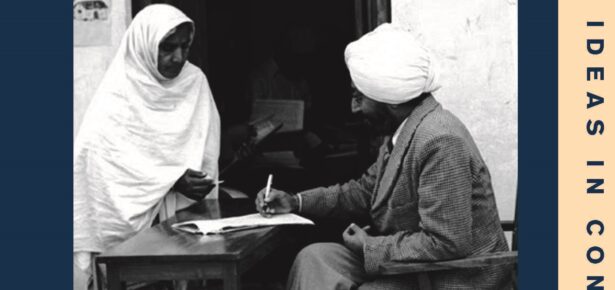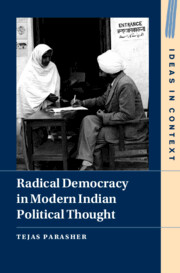
In February 1946, the Indian nationalist leader Narendra Deva (1889-1956), who had just spent three long years being held in prison at Ahmednagar Fort by British authorities, published a short essay on the relationship between democracy and anti-colonialism in South Asia. A close associate of both M.K. Gandhi and Jawaharlal Nehru, Deva had a well-developed reputation as an idiosyncratic socialist, someone equally steeped in classical Buddhist teachings and in Marx.
Deva’s essay warned about the “corrupting influence” of what he derisively called “the parliamentary program” of anti-colonial nationalism. In a democratic state, Deva explained, the most important political actors were “the sovereign people” (which he glossed with the Hindi term janata). Yet, according to Deva, multi-party parliamentary democracies imposed structural limitations on the capacity of this category – “the sovereign people” – to act collectively. In such regimes, the will of the people or janata was reduced to the actions and decisions of a limited number of politicians who emerged victorious “in a scramble for seats in legislatures.” Thus, so long as the nationalist movement in British India viewed self-determination in terms of the creation of an elected federal parliament free of imperial control, Deva declared that anti-colonialism’s commitment to democracy would always be suspect, and the “masses” of India would continue to be ruled by a well-defined political class.
From today’s perspective, Deva’s article looks puzzling. It is difficult to reconcile with the general trend of world politics since the mid-1940s. His steadfast commitment to securing democratic self-rule for colonial subjects seems to align with the values of postwar liberal cosmopolitanism – one is reminded of the importance John Rawls gave to political democracy as a global value in The Law of Peoples (1999) – but his apprehension about electoral competition and procedural constitutional democracy seems alien – certainly to liberal, Rawlsian sensibilities, but also more generally. As it circulated globally across Asia and Africa in the postwar decades, the principle of popular self-government was almost invariably equated with the regime-type of electoral, representative democracy (in either its multi-party or one-party variant), by historians, political philosophers, and international lawyers as much as by the leaders of national liberation movements. Said differently, even as democracy gradually became a worldwide standard of political and constitutional legitimacy, its collapse into statism and representative democracy came to be accepted, unquestioningly and uncritically, in both thought and practice.
Narendra Deva’s essay shows us, however, that this was not always the case. It hints at an earlier moment within the history of anti-colonialism when ideas of self-rule and popular sovereignty were not yet considered straightforwardly synonymous with modern representative government. These ideas were, rather, subject to considerable contestation and disagreement – and provided the normative foundation for ambitious constitutional experiments. A half-century or so after the formal end of European imperial rule, recognizing such a prior moment pushes us to fundamentally reassess how we understand the triangular relationship between anti-colonial nationalism, self-determination, and political representation in the twentieth century.
My new book, Radical Democracy in Modern Indian Political Thought (Cambridge 2023), aims to provide just such a revised understanding of anti-colonial political thought. The book traces the evolution of an anti-parliamentary discourse of politics in British India between the 1910s and 1970s. I show how the escalation of militant anti-colonial protest and mass political action in the first two decades of the twentieth century produced currents of political thought critical of the liberal constitutional imagination of the first generation of Indian nationalists. I then track the ways that the appeal of an anti-electoral, robustly participatory form of republicanism became amplified following the rise of M.K. Gandhi in the 1920s and the nationalist encounter with Marxism, Leninism, and other currents of socialist thought in the 1930s and 1940s. Within the anti-parliamentary tradition, I argue, self-rule (swaraj) came to be understood as requiring a number of key constitutional and economic reforms: federalism, access of citizens to the process of legislation, control over the actions of lawmakers and public officials, and a collectivist transformation of economic production, ownership, and private property relations. The book reconstructs the biographies and arguments of the main proponents of this tradition: Radhakamal Mukerjee, Joseph Kumarappa, Narendra Deva, K.T. Shah, M.N. Roy, and many others. It situates their writings within a diverse range of political contexts, from the princely state of Mysore in the 1920s to the experimental Gandhian sanctuary of Wardha in the 1930s to the drafting of India’s post-independence constitution in New Delhi in the 1940s.
By recovering what I call the “radical democratic” theory of anti-colonial nationalism, the book seeks to help readers gain a more nuanced view of the decades-long historical process through which self-determination and popular self-rule came to be globalized beyond Western Europe and North America in the twentieth century. Above all, the book demonstrates the polyvocal nature of modern democracy’s globalization, presenting it as a complex process that generated competing theories and forms of political representation, many of which challenged regnant paradigms of constitutionalism, but did not, in the end, triumph with the end of empire. To return to these defeated alternatives of self-rule, I suggest, is to better appreciate the remarkable array of political and economic forms that democracy has attained over the last hundred years, on its path to global ascendance.

Radical Democracy in Modern
Indian Political Thought by Tejas Parasher
Latest Comments
Have your say!